M.J. Johnson's Blog, page 13
July 18, 2013
Two Visits to Pompeii
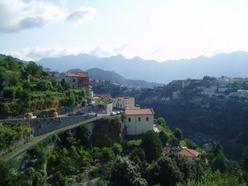 Scala The first time we visited Pompeii was some years ago when we were staying in a village called Scala (literally 'Steps' - and they weren't fibbing!) on the Amalfi Coast. Scala itself is roughly about three or four miles from the nearest bit of coast at Amalfi, reached by pursuing a torturously winding road which snakes its way through the steep hillsides.
Scala The first time we visited Pompeii was some years ago when we were staying in a village called Scala (literally 'Steps' - and they weren't fibbing!) on the Amalfi Coast. Scala itself is roughly about three or four miles from the nearest bit of coast at Amalfi, reached by pursuing a torturously winding road which snakes its way through the steep hillsides. Heading towards Amalfi Until the 1930s, when the road was built, the only way down was via the numerous steps that run up and down the hills, on which you might still encounter the occasional farmer riding a mule carrying water bottles. We found it was possible to get to Amalfi from our hotel in the village in under twenty minutes. We waved goodbye to a nice Italian couple one morning who had rushed through breakfast, intending to get a bus from the village to Amalfi, in order to catch a coach to Sorrento. We finished our breakfast in a leisurely fashion and took the steps. We were waiting at the coach stop in Amalfi as they alighted from the village bus - trying hard not to look too smug!
Heading towards Amalfi Until the 1930s, when the road was built, the only way down was via the numerous steps that run up and down the hills, on which you might still encounter the occasional farmer riding a mule carrying water bottles. We found it was possible to get to Amalfi from our hotel in the village in under twenty minutes. We waved goodbye to a nice Italian couple one morning who had rushed through breakfast, intending to get a bus from the village to Amalfi, in order to catch a coach to Sorrento. We finished our breakfast in a leisurely fashion and took the steps. We were waiting at the coach stop in Amalfi as they alighted from the village bus - trying hard not to look too smug!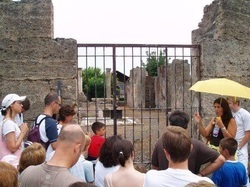 We took a day-trip organised by our tour operator to see Pompeii and the volcano Vesuvius. The one and a half hour guided tour of Pompeii, with a commentary in English and Italian because the group was mixed, was inevitably disappointing. It was a bit like taking a trip to the British Museum and finding you only have enough time to look around the foyer and bookshop!
We took a day-trip organised by our tour operator to see Pompeii and the volcano Vesuvius. The one and a half hour guided tour of Pompeii, with a commentary in English and Italian because the group was mixed, was inevitably disappointing. It was a bit like taking a trip to the British Museum and finding you only have enough time to look around the foyer and bookshop!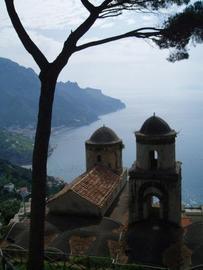 The Amalfi Coast because of its terrain is not an easy place to get to and from without difficulty. The coach to Sorrento, probably a distance of less than twenty miles, takes over an hour and a half for example, as there is just one narrow road that weaves and bends its way along the coast. The trip to Pompeii convinced us to enjoy Scala as a place for walking amongst lemon groves and spectacular scenery. After a few days of going up and down literally hundreds and hundreds of steps we also developed calf muscles worthy of Popeye. However, we did formulate a plan to 'do' Pompeii properly sometime.
The Amalfi Coast because of its terrain is not an easy place to get to and from without difficulty. The coach to Sorrento, probably a distance of less than twenty miles, takes over an hour and a half for example, as there is just one narrow road that weaves and bends its way along the coast. The trip to Pompeii convinced us to enjoy Scala as a place for walking amongst lemon groves and spectacular scenery. After a few days of going up and down literally hundreds and hundreds of steps we also developed calf muscles worthy of Popeye. However, we did formulate a plan to 'do' Pompeii properly sometime. We did some research, and two years later we chose to book a hotel as base in Sorrento. We discovered an excellent thing called an Arte Card, which for a reasonable price included bus and train travel anywhere in Campania, and free entry at a certain number of historical sites. The ancient ruined city of Pompeii is only about twenty minutes on the Circumvesuviana train route, which runs from the centre of Sorrento to Pompei Scavi. We spent about fifteen hours at Pompeii over the two-week holiday and literally only scratched the surface - but inevitably there were other places we wanted to see and of course had to find time for relaxation too. It is the most incredible place, a city that met a sudden irrevocable end, and has been frozen in time since that moment. The human plaster casts (some of which are on display) were made by filling the space in the ash left where the two thousand asphyxiated victims of Vesuvius, including their domesticated animals fell and rose no more. They lay buried for the next fifteen hundred years beneath approximately 16 or 17 feet of volcanic ash.
We did some research, and two years later we chose to book a hotel as base in Sorrento. We discovered an excellent thing called an Arte Card, which for a reasonable price included bus and train travel anywhere in Campania, and free entry at a certain number of historical sites. The ancient ruined city of Pompeii is only about twenty minutes on the Circumvesuviana train route, which runs from the centre of Sorrento to Pompei Scavi. We spent about fifteen hours at Pompeii over the two-week holiday and literally only scratched the surface - but inevitably there were other places we wanted to see and of course had to find time for relaxation too. It is the most incredible place, a city that met a sudden irrevocable end, and has been frozen in time since that moment. The human plaster casts (some of which are on display) were made by filling the space in the ash left where the two thousand asphyxiated victims of Vesuvius, including their domesticated animals fell and rose no more. They lay buried for the next fifteen hundred years beneath approximately 16 or 17 feet of volcanic ash.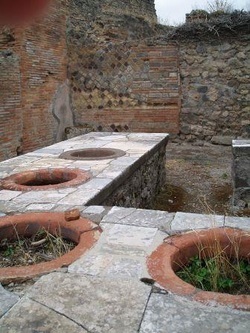 A bar Pompeii style You can picture wives gossiping on the streets of the easily imagined porticoed shops. Or see whole families as they go to the theatres, or revel in their municipal excellence at the games put on for their appreciation by the city fathers. Or imagine craftsmen, or businessmen, or the many visitors the town must have had, sitting around in the various bars with a glass of wine: or chilling-out in its marvellous baths (I think the only place in the city where its curved and corrugated ceilings remain intact), or indulging in more carnal pleasures at the brothel with its pictorial menu of sexual offerings ( because not every tourist and visitor to the city spoke Latin). Apparently, the townsfolk of nearby Herculaneum ( also destroyed and equally worth visiting) found the people of Pompeii a little garish and vulgar - snobbery it seems is nothing new. Pompeii was renowned for its 'Garum', a kind of sauce made from the fermentation of fish, pretty stinky and probably a bit unpalatable to modern tastes, but the Roman world loved the stuff and Pompeii was famous and rich from the export of it.
A bar Pompeii style You can picture wives gossiping on the streets of the easily imagined porticoed shops. Or see whole families as they go to the theatres, or revel in their municipal excellence at the games put on for their appreciation by the city fathers. Or imagine craftsmen, or businessmen, or the many visitors the town must have had, sitting around in the various bars with a glass of wine: or chilling-out in its marvellous baths (I think the only place in the city where its curved and corrugated ceilings remain intact), or indulging in more carnal pleasures at the brothel with its pictorial menu of sexual offerings ( because not every tourist and visitor to the city spoke Latin). Apparently, the townsfolk of nearby Herculaneum ( also destroyed and equally worth visiting) found the people of Pompeii a little garish and vulgar - snobbery it seems is nothing new. Pompeii was renowned for its 'Garum', a kind of sauce made from the fermentation of fish, pretty stinky and probably a bit unpalatable to modern tastes, but the Roman world loved the stuff and Pompeii was famous and rich from the export of it.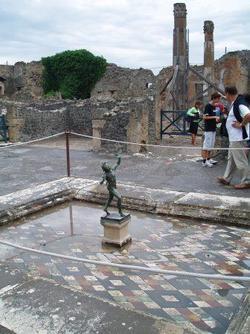 House of the Faun However, conservation at Pompeii and the vast area it covers is a major headache, and every year the site deteriorates a bit more. For over fifteen hundred years the molten ash that had destroyed and buried it was its protector, but exposed to the sun, air and the 2.5 million tourists that visit annually, the site is under huge pressure. When we visited the Villa of Mysteries, beyond the Necropolis and outside the city walls, decorated with the most exquisite wall paintings, we were horrified to see our walking boots scuffing the ground and unintentionally kicking-up pieces of two thousand year old mosaic floor tiles. Pompeii is a marvellous piece of human heritage, a place where people lived, played, worked and died. I felt like they were reaching out across two millenia and saying to me, 'we were much the same as you, had similar ambitions and passions, vanities and foibles'.
House of the Faun However, conservation at Pompeii and the vast area it covers is a major headache, and every year the site deteriorates a bit more. For over fifteen hundred years the molten ash that had destroyed and buried it was its protector, but exposed to the sun, air and the 2.5 million tourists that visit annually, the site is under huge pressure. When we visited the Villa of Mysteries, beyond the Necropolis and outside the city walls, decorated with the most exquisite wall paintings, we were horrified to see our walking boots scuffing the ground and unintentionally kicking-up pieces of two thousand year old mosaic floor tiles. Pompeii is a marvellous piece of human heritage, a place where people lived, played, worked and died. I felt like they were reaching out across two millenia and saying to me, 'we were much the same as you, had similar ambitions and passions, vanities and foibles'.The ancient Roman city of Pompeii lies close to the modern and similarly named suburb of Naples, Pompei. Together with the neighbouring town of Herculaneum, it was destroyed when Mount Vesuvius erupted in 79 AD. The population of Pompeii is estimated to have been about 20,000, and it's thought about ten percent actually died there. An eye-witness account of the eruption exists, written by Pliny the Younger who watched the whole thing from across the Bay of Naples.
There is currently a major exhibition about Pompeii on at the British Museum.
Published on July 18, 2013 03:09
July 10, 2013
Just William
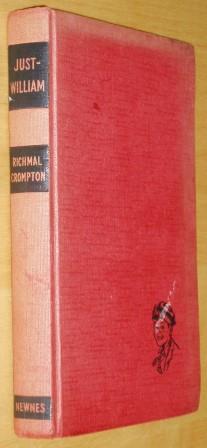 I've been doing quite a bit of serious reading, research etc for the book I'm currently working on, and ploughing through The Richard Burton Diaries, although hugely enjoyable, was massive with interesting footnotes (which I am pathologically unable to avoid) on just about every page. Something must always be read of course, otherwise a day wouldn't be complete. And when in doubt about what might be next, I sometimes turn to the book guru at my side and get her advice. She takes books very seriously, and seeking her assistance is a bit like paying a visit to a medical practitioner.
I've been doing quite a bit of serious reading, research etc for the book I'm currently working on, and ploughing through The Richard Burton Diaries, although hugely enjoyable, was massive with interesting footnotes (which I am pathologically unable to avoid) on just about every page. Something must always be read of course, otherwise a day wouldn't be complete. And when in doubt about what might be next, I sometimes turn to the book guru at my side and get her advice. She takes books very seriously, and seeking her assistance is a bit like paying a visit to a medical practitioner.Two minutes is generally all it takes. "I know," she said, "How about Just William."
"I haven't read any Richmal Crompton since I was a boy," I said. They were always a firm favourite then, especially if I was off school with a mild temperature. Pure bliss, a glass of lemon barley water on the bedside table and a 'William' to read. Many of these books which I'd have read around the mid-sixties were published by Armada with new illustrations. These are more cartoonish than the charming originals by Thomas Henry and the collections of stories themselves were cobbled together from several books and given new titles. This wouldn't have bothered me as a boy, but as a man I like to read things in the order they are written and how an author intended. The book guru was on the case and returned from our back bedroom (yes, books in every room!) with a hardback copy of Just William that bore the inscription:
To Ian
With Best Wishes
From Wynne
Christmas 1957
Although Wynne went on to become a distinguished professor of Mathematics, I doubt he was writing in such a well practised hand, being only two years old in 1957 as I was! Now here's an interesting piece of synchronicity; the last time I saw Wynne was at Theatr (no E in Welsh version) Gwynedd, Bangor, North Wales when I was performing with The Welsh Drama Company in the late seventies. However, I received a message from him completely out of the blue only yesterday - he'd found me through this blog and used the website Contact Form to email me! Now isn't that incredible - that I was currently reading a book with his name in it? Reconnecting with people I'd lost touch with has been the unexpected great bonus of keeping this blog and website going.
Anyway, back to Richmal Crompton (1890 - 1969) and the William Stories. She was born in Bury, Lancashire, the daughter of a clergyman. She graduated in 1914 from The Royal Holloway College, part of The University of London, with a BA in Classics, and was involved in the women's suffrage movement. In 1923, after contracting polio, she lost the use of her right leg, which seems to have precipitated giving up her teaching career to write full time. She wrote all-told thirty-nine William books throughout her lifetime, the first being Just William (1922) and the last William the Lawless (1970, published posthumously). She wrote over a hundred other books, many for adults, but it is the William books that she is remembered for.
And what was it like reading Just William again? I can only describe the experience as sublime. For someone who never married and didn't have children of her own, Richmal Crompton manages to get right under the skin of an eleven year old boy in a way that no one else, to my mind, has ever done better. These highly amusing stories about force of nature William Brown and his band of pals who call themselves The Outlaws are pure delight. For the past week the guru can testify to the fact that there has been a good deal of chuckling and a few whoops of delight coming from my side of the bed. Incredible to think that Just William was over forty years old when I first read it, and is now over ninety. We read the stories to our son when he was small and he lapped them up. They have a sense of period obviously and are of the time when they were written, but they haven't really dated. Maybe this is because she knew her subject so well and eleven year old boys haven't really changed very much. I mean to say what's a mere ninety years in the evolution of boys! Four hundred odd years ago William Shakespeare wrote:
And then the whining school-boy, with his satchel
And shining morning face, creeping like snail
Unwillingly to school.
So, no change there then!
Published on July 10, 2013 14:16
July 3, 2013
The Winds of War and Me!
Published on July 03, 2013 14:00
June 26, 2013
The Richard Burton Diaries
Published on June 26, 2013 14:44
June 18, 2013
Fathers, Sons and Family Ties
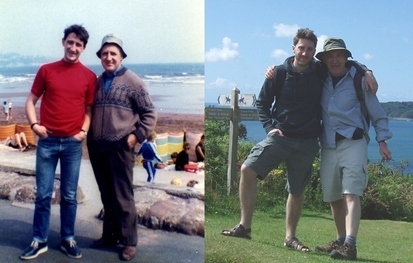 Father/Son 1981 and 2001 I try to keep this blog on its toes and do my best to keep the pieces focused and varied; avoiding too many rambles, rants and nostalgia pieces. I suppose this one would probably get classified under the latter heading out of that group - but Father's Day having just passed in a week that finds me again heading for Wales and yet another family funeral can do that to a person!
Father/Son 1981 and 2001 I try to keep this blog on its toes and do my best to keep the pieces focused and varied; avoiding too many rambles, rants and nostalgia pieces. I suppose this one would probably get classified under the latter heading out of that group - but Father's Day having just passed in a week that finds me again heading for Wales and yet another family funeral can do that to a person!Despite having lived elsewhere for the lion's portion of my life, Wales remains the place I think of as my spiritual home. My son Tom recently showed a blog I'd written about my late mother to an acquaintance of his who also comes from my town of origin, ie Aberdare in the Cynon Valley. This person went on to show the piece to an old family friend of hers who still continues to live there. Some days later, Tom enthusiastically reported back to me that this elderly gentleman could recall playing football with my father. Dad was thirty-three years old by the time I was born, so his footballing days were already behind him. Being a man of quiet modesty, it was in fact only through the testimonies of others that I found out what a truly superb footballer he'd been. You know how it is, as a teenager when someone whispers in your ear about how talented your father is, you tend to instantly discount it as being nothing more than the ramblings of old men. However, when every single contemporary of your father's goes on for the next forty or so years telling you how fantastically well he played; how, if he'd been born into a different age they have no doubt he'd have given the footballing heroes of later generations, the Bests and Beckhams a good run for their money - I guess you finally start paying
attention!
Unfortunately whatever aspirations Dad may have had in the sporting line were disastrously hampered (like a lot of careers for men and women of that generation) by unwanted interference from 'A' list despotic madman, Adolf Hitler. My grandfather had fought in the First World War, while my other Grandad was busy cutting coal underground, and my father joined up for the second because he felt he ought to. However, he wasn't the sort of man who would have gone along with it arbitrarily; he had strong religious convictions and serious doubts about killing his fellow man. Dad's personal opinion of war: "A complete waste of time". I don't think by this that he meant that either of these wars had been necessarily avoidable, just literally that - a waste of time - and of human life of course!
My father was always spoken of with great respect by those who knew him best, the men and women of his own generation. When Dad and his 'gang' had gone off to war, Mr Morse, the minister at their chapel Ebenezer in Trecynon, who I recall with a faint memory and a warm glow, wouldn't allow anyone for the duration of the war to sit in the upstairs pew where they habitually sat, which remained vacant throughout. If anyone attempted to sit there, Mr Morse would explain, "I'm very sorry but you can't sit there because that's where the boys sit". This line was maintained until the boys came back; and they all did.
For a man who left school at fourteen my father was remarkably well-read. He was naturally sharp-witted and tended to apply a natural psychology when it came to dealing with his fellow man. Nobody else in the chapel understood why Danny Johnson's Sunday school class comprising of several of the 'naughtiest boys' was always at full capacity and the best-behaved of all the groups. Years later it was confessed that only the first half of Dad's Sunday school class was devoted to the Bible, the second half being entirely dedicated to football. I can picture the compliance of more than a dozen small boys awaiting that delicious moment when they could give Jeroboam and Nebuchadnezzar the boot, get out their Players' cigarette football cards, arrange them with careful fastidiousness along the communion wine shelf at the back of the pew and get down to some serious business.
The chapel, Ebenezer, a place I recently heard described as having been in its heyday a formidable force in the lives of the people of Trecynon, Aberdare,
is in the process of being adapted into a private residence. The funeral service I'm attending this week will be held in what was once its vestry, and which has in recent years become the main place of worship for a dwindling congregation. Dad's cousin Pat (Patricia) had not long turned eighty when she died after a short illness. We called to see her in January and she seemed as fit as a fiddle, and the likelihood of returning for such a purpose seemed many years off. It will fill me with what we Welsh call 'hiraeth' (sort of 'longing' and 'sadness' combined) to attend this funeral.
Published on June 18, 2013 23:43
June 12, 2013
Norman Lewis
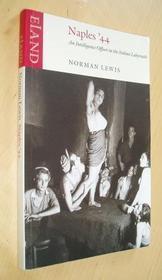 Naples '44 by Norman Lewis One of the great constants throughout my life has been settling down with a book at bedtime. I occasionally get to gulp down the odd page or two during the day or early evening, but it's generally only at the day's end whilst resting in my bed that allows enough space for any proper literary digestion. As a teenager I'd quite regularly read all night, or drop off to sleep with a book still in my hand - and occasionally I still do (fall asleep with the book that is - if I read all night these days I'd be doing far too accurate an impersonation of a ghost for the next week!). Of course, I'm rarely alone as I partake of this nightly pleasure; alongside me is my life's companion and best reading chum, Judith. Our reading tastes have always differed in many ways, but as a rule, when it comes down to what we both consider to be great writing, we almost always agree.
Naples '44 by Norman Lewis One of the great constants throughout my life has been settling down with a book at bedtime. I occasionally get to gulp down the odd page or two during the day or early evening, but it's generally only at the day's end whilst resting in my bed that allows enough space for any proper literary digestion. As a teenager I'd quite regularly read all night, or drop off to sleep with a book still in my hand - and occasionally I still do (fall asleep with the book that is - if I read all night these days I'd be doing far too accurate an impersonation of a ghost for the next week!). Of course, I'm rarely alone as I partake of this nightly pleasure; alongside me is my life's companion and best reading chum, Judith. Our reading tastes have always differed in many ways, but as a rule, when it comes down to what we both consider to be great writing, we almost always agree.For the past ten days I've been listening to her chirp and coo like a contented bird on her perch beside me. She has been reading I Came, I Saw, an autobiography of the British writer Norman Lewis. Lewis is probably best remembered these days as a travel writer, however over his long lifetime he also wrote thirteen novels. I've personally never read any of his fictional works, in fact I'm not quite certain any are still in print, but I daresay you'd be able to find them second-hand, and I reckon they would still be worth the effort. Lewis wrote prose with such blinding ease and elegance that he makes you forget you're actually reading. His sentences, free of any surplus fat, are lean but satisfying. I think the best way I could describe his skill is to say that his words somehow always carry backbone and musculature. Cyril Connolly once said of him that he could make a lorry interesting. And the distinguished author Graham Greene had no hesitation in describing him as, "One of the best writers, not of any particular decade, but of our century."
I first discovered him in 2006 when a friend of my son's gave me a copy of what is widely considered to be his finest work, Naples '44, for my birthday. Southern Italy was our holiday destination that year and Naples was somewhere we planned to visit. For an account of the suffering encountered by a starving population in a heavily bombed and devastated city in war-torn Europe, this book takes some beating. Since then I've gone on to read a number of his other works including The Honoured Society (1964), which was serialised in The New Yorker and highly regarded in its day as being the first book to offer any real insight into the Sicilian Mafia. Both these titles and many more are published by Eland.
Norman Lewis was born in 1908 in Enfield, North London. His parents were both Welsh, and Lewis was naturally a shy type. Because of bullying encountered at his Enfield Grammar school, he was sent off to stay with three completely nutty Welsh aunts in Carmarthenshire for a while. He spent much time travelling around the world, and lived for extended periods in various countries. An article of his written for the Sunday Times in 1968, Genocide in Brazil, caused great public outcry and led in turn to the creation of Survival International, dedicated to protecting the rights of 'first peoples'. Norman Lewis died at the age of 95 at his home in Essex in 2003.
Take my word for it, this man is really worth reading.
Published on June 12, 2013 11:39
June 5, 2013
The Lift
I can't remember whether I've ever mentioned my old college days friend Alessandro before on these pages. He had been studying at UCL while I was just across the road and round the corner at RADA. His family lived then as they probably do now in the city of Palermo, Sicily. I'm not one hundred percent certain exactly how or where we first met. At the pub I think is the most likely location, although it may equally well have been at one of those student parties. It doesn't really matter how it came about; we got on like a house on fire and for the next few terms we were pretty much inseparable. There were of course other friends within our group too, it wasn't an exclusive friendship, but Alessandro and I generally tended to be at the centre of things. This was probably because we shared the same interests: girls, alcohol, girls, theatre, girls, rock music, girls, movies, girls, literature and oh yes, did I mention this - we spent a lot of time thinking about girls!
But as inevitably happens, time moves on: I completed my course at RADA and began looking for work as an actor. We kept in contact with each other for a while but it was never quite the same. Eventually we lost touch altogether. A while later, I heard from a friend that Alessandro had returned home to Sicily. Of course, being Sicilian in the seventies, just a few years on from 'The Godfather' movie, had provided his pals with rich pastures for some good natured ribbing. And which Alessandro, fair play to him, always took in his stride. He could give as good as he got in this area and often referred to me as the 'Welsh pit pony'. I must say, I did occasionally wonder how he always had money in his pocket. Like most students by the end of each term I was pretty much skint, subsisting on white sliced bread and peanut butter. However, Alessandro never seemed to 'run dry' as it were. He would come round to see me and when I said I couldn't go out because I had no money, he'd exclaim, "No problem, pit pony, I will buy you a drink!" He rarely talked about his background and I only recall him confiding in me just the once when we were both a little worse for wear about his family. He claimed to be the son of a Sicilian prince, a fact I swallowed (drunk at the time as I was) with a very large pinch
of salt.
From time to time over the years I'd thought about him and wondered what he was up to, then last year, due to the marvel of the internet and social media, he sent me a tweet from his Twitter account to mine: 'Bon Giorno, pit pony! I enjoyed Niedermayer & Hart. Ciao!' it said. I knew who it was at once without bothering to analyse his Twitter name. Anyway, to cut a long story short we were back in touch again. We became friends on Facebook and have started to
tweet at each other regularly. Then about a month ago I received a rather opulent looking envelope through the post that bore a lot of unneccessary gold, swirly lettering and with a large ornate crest of some kind on the back. It was an invitation to a cocktail party at a suite at the Ritz hotel in London. The invitation was from Don Alessandro Giuseppe di Corbera. 'Blimey!' I thought, 'It was all the truth!'
So last week I went to visit my old chum. My wife Judith wasn't able to join me unfortunately because she had a very heavy head cold. I took a copy of my new book Roadrage as a gift for Alessandro. The man at reception directed me to the lift and told me which floor to get off at and how to reach Senor di Corbera's suite from there. I must admit to being very excited at this point. I entered the lift clutching my book under my arm. There was already a passenger in the
lift, a woman but I was so eager to see my friend that I paid her no attention. The doors closed and we started to ascend rapidly only to come to an unusually abrupt and quite shocking stop with a sudden jolt. It wasn't the way I'd imagined the lift at one of London's finest hotels might operate.
We seemed to be dangling in mid air for a moment, then the lights went out, but fortunately after a few seconds we were rescued from complete darkness. It was only then, as the light returned, that I noticed my companion was the famous chat show host Oprah Winfrey.
"This ever happen to you before?" she asked.
"Sorry?" I replied, feeling a bit flummoxed by her remark and rather disorientated by her presence.
"Ever been trapped in an elevator before?" she elucidated.
"No never," I replied.
"That's good to know," she smiled, "If I knew I was stuck in an elevator with some kind of Jonah, I'd consider panicking."
Just then the telephone rang. Still flummoxed, I looked all round trying to locate the thing. Miss Winfrey pointed out the small steel door in the lift wall right next to my shoulder marked 'Telephone'. "Ah, yes, I see," I said sheepishly.
I listened as the nice man from reception assured me they would be getting their maintenance team onto the problem right away. However it might possibly take half an hour.
When I explained what I'd just been told, Miss Winfrey casually slid down the smooth lift wall and sat on the floor,"May as well get comfortable," she said.
I parked myself on the floor alongside her.
"What's that you're holding?" she asked.
"It's a book ... Roadrage ... for a friend," I said.
"Any good?" she asked.
"I hope so!" I said.
"Why, you write the thing or something?" she asked.
I nodded.
"Say, you didn't sabotage the elevator, like Cathy Bates in that Stephen King book?"
I was horrified by the suggestion and shook my head vigorously, "Er, no. 'Course not."
"Mind if I take a look?" she chuckled.
"Er, no, not at all, " I said, immediately handing over the copy.
The man from reception rang about twenty minutes later, and Oprah Winfrey barely looked up when I relayed the bad news and conveyed his profuse apologies that the problem might possibly take a couple of hours to resolve. From then on he tended to ring every half an hour or so to give us little updates on any progress that had been made in securing our release.
At first Miss Winfrey looked only a little annoyed by his interruptions to her reading, but as she neared the book's denouement she waved the back of her hand irritably at the phone when it rang and said, "Tell that guy to stop annoying people!"
Shortly after this, and roughly three hours after we'd first been trapped together, Miss Winfrey closed the book and smiled, "Congratulations," she said, before adding, "Say, do you know that back home I run a book club?"
I nodded and answered with some diffidence that I did.
"Well when I get back home this book is going to be my b...."
I wondered why her words faded at that moment and her voice was suddenly replaced by my wife's, "Oh, Mart, that cup of tea I left on your desk has gone cold!"
"Huh?" I looked around confusedly.
"What on earth have you been doing? Staring out the window, letting cups of tea go cold! I thought you were writing a letter to the bank?
"Oh yes, the letter to the bank ..."
"You were far away ... what were you thinking about anyhow?"
"Oh, oh, nothing," I fibbed.
Tapocketa ... Tapocketa ... Tapocketa ....
But as inevitably happens, time moves on: I completed my course at RADA and began looking for work as an actor. We kept in contact with each other for a while but it was never quite the same. Eventually we lost touch altogether. A while later, I heard from a friend that Alessandro had returned home to Sicily. Of course, being Sicilian in the seventies, just a few years on from 'The Godfather' movie, had provided his pals with rich pastures for some good natured ribbing. And which Alessandro, fair play to him, always took in his stride. He could give as good as he got in this area and often referred to me as the 'Welsh pit pony'. I must say, I did occasionally wonder how he always had money in his pocket. Like most students by the end of each term I was pretty much skint, subsisting on white sliced bread and peanut butter. However, Alessandro never seemed to 'run dry' as it were. He would come round to see me and when I said I couldn't go out because I had no money, he'd exclaim, "No problem, pit pony, I will buy you a drink!" He rarely talked about his background and I only recall him confiding in me just the once when we were both a little worse for wear about his family. He claimed to be the son of a Sicilian prince, a fact I swallowed (drunk at the time as I was) with a very large pinch
of salt.
From time to time over the years I'd thought about him and wondered what he was up to, then last year, due to the marvel of the internet and social media, he sent me a tweet from his Twitter account to mine: 'Bon Giorno, pit pony! I enjoyed Niedermayer & Hart. Ciao!' it said. I knew who it was at once without bothering to analyse his Twitter name. Anyway, to cut a long story short we were back in touch again. We became friends on Facebook and have started to
tweet at each other regularly. Then about a month ago I received a rather opulent looking envelope through the post that bore a lot of unneccessary gold, swirly lettering and with a large ornate crest of some kind on the back. It was an invitation to a cocktail party at a suite at the Ritz hotel in London. The invitation was from Don Alessandro Giuseppe di Corbera. 'Blimey!' I thought, 'It was all the truth!'
So last week I went to visit my old chum. My wife Judith wasn't able to join me unfortunately because she had a very heavy head cold. I took a copy of my new book Roadrage as a gift for Alessandro. The man at reception directed me to the lift and told me which floor to get off at and how to reach Senor di Corbera's suite from there. I must admit to being very excited at this point. I entered the lift clutching my book under my arm. There was already a passenger in the
lift, a woman but I was so eager to see my friend that I paid her no attention. The doors closed and we started to ascend rapidly only to come to an unusually abrupt and quite shocking stop with a sudden jolt. It wasn't the way I'd imagined the lift at one of London's finest hotels might operate.
We seemed to be dangling in mid air for a moment, then the lights went out, but fortunately after a few seconds we were rescued from complete darkness. It was only then, as the light returned, that I noticed my companion was the famous chat show host Oprah Winfrey.
"This ever happen to you before?" she asked.
"Sorry?" I replied, feeling a bit flummoxed by her remark and rather disorientated by her presence.
"Ever been trapped in an elevator before?" she elucidated.
"No never," I replied.
"That's good to know," she smiled, "If I knew I was stuck in an elevator with some kind of Jonah, I'd consider panicking."
Just then the telephone rang. Still flummoxed, I looked all round trying to locate the thing. Miss Winfrey pointed out the small steel door in the lift wall right next to my shoulder marked 'Telephone'. "Ah, yes, I see," I said sheepishly.
I listened as the nice man from reception assured me they would be getting their maintenance team onto the problem right away. However it might possibly take half an hour.
When I explained what I'd just been told, Miss Winfrey casually slid down the smooth lift wall and sat on the floor,"May as well get comfortable," she said.
I parked myself on the floor alongside her.
"What's that you're holding?" she asked.
"It's a book ... Roadrage ... for a friend," I said.
"Any good?" she asked.
"I hope so!" I said.
"Why, you write the thing or something?" she asked.
I nodded.
"Say, you didn't sabotage the elevator, like Cathy Bates in that Stephen King book?"
I was horrified by the suggestion and shook my head vigorously, "Er, no. 'Course not."
"Mind if I take a look?" she chuckled.
"Er, no, not at all, " I said, immediately handing over the copy.
The man from reception rang about twenty minutes later, and Oprah Winfrey barely looked up when I relayed the bad news and conveyed his profuse apologies that the problem might possibly take a couple of hours to resolve. From then on he tended to ring every half an hour or so to give us little updates on any progress that had been made in securing our release.
At first Miss Winfrey looked only a little annoyed by his interruptions to her reading, but as she neared the book's denouement she waved the back of her hand irritably at the phone when it rang and said, "Tell that guy to stop annoying people!"
Shortly after this, and roughly three hours after we'd first been trapped together, Miss Winfrey closed the book and smiled, "Congratulations," she said, before adding, "Say, do you know that back home I run a book club?"
I nodded and answered with some diffidence that I did.
"Well when I get back home this book is going to be my b...."
I wondered why her words faded at that moment and her voice was suddenly replaced by my wife's, "Oh, Mart, that cup of tea I left on your desk has gone cold!"
"Huh?" I looked around confusedly.
"What on earth have you been doing? Staring out the window, letting cups of tea go cold! I thought you were writing a letter to the bank?
"Oh yes, the letter to the bank ..."
"You were far away ... what were you thinking about anyhow?"
"Oh, oh, nothing," I fibbed.
Tapocketa ... Tapocketa ... Tapocketa ....
Published on June 05, 2013 07:11
May 29, 2013
The Saturday Night Laurel and Hardy Came to the Rescue
In our home television is something rarely watched. Not because we have anything against television, it's great, but we rarely find time during the week, and at the weekend we generally catch a film on DVD. My wife Judith and I definitely like reading best of all. However, as I've mentioned a number of times now in these columns, we are very partial to visits to our local cinema when they show plays transmitted/streamed 'Live' from the National Theatre on London's South Bank. The last one we watched was a few weeks back, and a truly exceptional example of ensemble theatre it was too. So much so, that it would seem unjust to mention any individual as outstanding, the entire cast was working very hard indeed and acting their collective socks off!
 The play was This House, a brand new comedy by James Graham set in the Houses of Parliament. Believe me, I wouldn't have considered it likely to spend an evening surrounded by uproarious laughter, watching a play about the respective Whips' offices of the Government and its Opposition - but this was how it was! It's set in 1974, a time when a Labour government held on to power with the tiniest of majorities. It was a period of social upheaval, of ferocious rivalry in Parliament yet with little ground ever gained to show for it. Not much could be achieved politically because it was always necessary for the government to strike deals with the minor parties at Westminster - a kind of political doldrums existed! People were rushed in to the house to vote on Bills from their hospital or even 'death' beds. The wealth of North Sea Gas and Oil, that would shore-up and sustain the years of Margaret Thatcher's government, had not yet started flowing into government coffers. It would have been a difficult era to have been in power for a government of any persuasion. However, strangely, as I look back at that decade (I was nineteen in '74) there was a sense of equality and classlessness in British society that I have not recognised there since. I don't recall anyone in those times boasting about which prep school they went to, or even letting on they'd even been to one - cut-glass public school accents were most definitely toned down. The time of 'getting' was about to be born in the Eighties with a zealousness previously unknown in 20th century British life. Politicians are opportunistic by nature - leaf back through the pages of history and it is generally the timing of their ascendancy to power that enables them to acquire their reputed 'greatness', I think.
The play was This House, a brand new comedy by James Graham set in the Houses of Parliament. Believe me, I wouldn't have considered it likely to spend an evening surrounded by uproarious laughter, watching a play about the respective Whips' offices of the Government and its Opposition - but this was how it was! It's set in 1974, a time when a Labour government held on to power with the tiniest of majorities. It was a period of social upheaval, of ferocious rivalry in Parliament yet with little ground ever gained to show for it. Not much could be achieved politically because it was always necessary for the government to strike deals with the minor parties at Westminster - a kind of political doldrums existed! People were rushed in to the house to vote on Bills from their hospital or even 'death' beds. The wealth of North Sea Gas and Oil, that would shore-up and sustain the years of Margaret Thatcher's government, had not yet started flowing into government coffers. It would have been a difficult era to have been in power for a government of any persuasion. However, strangely, as I look back at that decade (I was nineteen in '74) there was a sense of equality and classlessness in British society that I have not recognised there since. I don't recall anyone in those times boasting about which prep school they went to, or even letting on they'd even been to one - cut-glass public school accents were most definitely toned down. The time of 'getting' was about to be born in the Eighties with a zealousness previously unknown in 20th century British life. Politicians are opportunistic by nature - leaf back through the pages of history and it is generally the timing of their ascendancy to power that enables them to acquire their reputed 'greatness', I think.
Unfortunately, the production of This House, after two highly successful runs at the National, has finally come to an end. However, you may be fortunate enough to catch an 'encore showing' at a cinema near you. I believe there are also showings at different and varying times right across the world. I highly recommend this production.
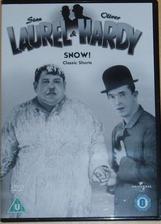 So, I hear you thinking, where do Laurel and Hardy come into things? Well, last Saturday we'd had a busy day and decided to sit down and watch a DVD. We chose something that promised to be entertaining and undemanding, but which turned out to be pretty crass and cliched. The apocalyptic ending was, despite an attempt at a bit of positive spin, rather depressing. Judith had made the choice (I'd suggested something tried and tested, 'When Harry met Sally' in fact). She looked at me at the film's end and said dolefully, "Mmm, feel a bit depressed now ... should have listened to you." It was then I remembered my Laurel and Hardy collection - a Christmas gift from a couple of years back. We're gradually working our way through them. The classic L & H short we watched was Laughing Gravy, filmed in 1931. It's not hard to imagine the joy this pair of buffoons brought to people during an era of hardship and global depression. We laugh at their stupidity, yet we love them for their innocence. Nobody but Stan and Ollie could manage to get themselves from a sleeping bedroom to a boarding-house roof and evicted within the lifespan of a short film. We watch with delight as they concoct one of their familiar hair-brained, doomed-to-fail plans, to rescue their little dog, the eponymous 'Laughing Gravy', from being cast out into the snow by a tyrannical landlord!
So, I hear you thinking, where do Laurel and Hardy come into things? Well, last Saturday we'd had a busy day and decided to sit down and watch a DVD. We chose something that promised to be entertaining and undemanding, but which turned out to be pretty crass and cliched. The apocalyptic ending was, despite an attempt at a bit of positive spin, rather depressing. Judith had made the choice (I'd suggested something tried and tested, 'When Harry met Sally' in fact). She looked at me at the film's end and said dolefully, "Mmm, feel a bit depressed now ... should have listened to you." It was then I remembered my Laurel and Hardy collection - a Christmas gift from a couple of years back. We're gradually working our way through them. The classic L & H short we watched was Laughing Gravy, filmed in 1931. It's not hard to imagine the joy this pair of buffoons brought to people during an era of hardship and global depression. We laugh at their stupidity, yet we love them for their innocence. Nobody but Stan and Ollie could manage to get themselves from a sleeping bedroom to a boarding-house roof and evicted within the lifespan of a short film. We watch with delight as they concoct one of their familiar hair-brained, doomed-to-fail plans, to rescue their little dog, the eponymous 'Laughing Gravy', from being cast out into the snow by a tyrannical landlord!
Neither of us recalled ever watching this one before and we were still chuckling about it at breakfast next morning.
Pure delight! Sheer genius!
 The play was This House, a brand new comedy by James Graham set in the Houses of Parliament. Believe me, I wouldn't have considered it likely to spend an evening surrounded by uproarious laughter, watching a play about the respective Whips' offices of the Government and its Opposition - but this was how it was! It's set in 1974, a time when a Labour government held on to power with the tiniest of majorities. It was a period of social upheaval, of ferocious rivalry in Parliament yet with little ground ever gained to show for it. Not much could be achieved politically because it was always necessary for the government to strike deals with the minor parties at Westminster - a kind of political doldrums existed! People were rushed in to the house to vote on Bills from their hospital or even 'death' beds. The wealth of North Sea Gas and Oil, that would shore-up and sustain the years of Margaret Thatcher's government, had not yet started flowing into government coffers. It would have been a difficult era to have been in power for a government of any persuasion. However, strangely, as I look back at that decade (I was nineteen in '74) there was a sense of equality and classlessness in British society that I have not recognised there since. I don't recall anyone in those times boasting about which prep school they went to, or even letting on they'd even been to one - cut-glass public school accents were most definitely toned down. The time of 'getting' was about to be born in the Eighties with a zealousness previously unknown in 20th century British life. Politicians are opportunistic by nature - leaf back through the pages of history and it is generally the timing of their ascendancy to power that enables them to acquire their reputed 'greatness', I think.
The play was This House, a brand new comedy by James Graham set in the Houses of Parliament. Believe me, I wouldn't have considered it likely to spend an evening surrounded by uproarious laughter, watching a play about the respective Whips' offices of the Government and its Opposition - but this was how it was! It's set in 1974, a time when a Labour government held on to power with the tiniest of majorities. It was a period of social upheaval, of ferocious rivalry in Parliament yet with little ground ever gained to show for it. Not much could be achieved politically because it was always necessary for the government to strike deals with the minor parties at Westminster - a kind of political doldrums existed! People were rushed in to the house to vote on Bills from their hospital or even 'death' beds. The wealth of North Sea Gas and Oil, that would shore-up and sustain the years of Margaret Thatcher's government, had not yet started flowing into government coffers. It would have been a difficult era to have been in power for a government of any persuasion. However, strangely, as I look back at that decade (I was nineteen in '74) there was a sense of equality and classlessness in British society that I have not recognised there since. I don't recall anyone in those times boasting about which prep school they went to, or even letting on they'd even been to one - cut-glass public school accents were most definitely toned down. The time of 'getting' was about to be born in the Eighties with a zealousness previously unknown in 20th century British life. Politicians are opportunistic by nature - leaf back through the pages of history and it is generally the timing of their ascendancy to power that enables them to acquire their reputed 'greatness', I think.Unfortunately, the production of This House, after two highly successful runs at the National, has finally come to an end. However, you may be fortunate enough to catch an 'encore showing' at a cinema near you. I believe there are also showings at different and varying times right across the world. I highly recommend this production.
 So, I hear you thinking, where do Laurel and Hardy come into things? Well, last Saturday we'd had a busy day and decided to sit down and watch a DVD. We chose something that promised to be entertaining and undemanding, but which turned out to be pretty crass and cliched. The apocalyptic ending was, despite an attempt at a bit of positive spin, rather depressing. Judith had made the choice (I'd suggested something tried and tested, 'When Harry met Sally' in fact). She looked at me at the film's end and said dolefully, "Mmm, feel a bit depressed now ... should have listened to you." It was then I remembered my Laurel and Hardy collection - a Christmas gift from a couple of years back. We're gradually working our way through them. The classic L & H short we watched was Laughing Gravy, filmed in 1931. It's not hard to imagine the joy this pair of buffoons brought to people during an era of hardship and global depression. We laugh at their stupidity, yet we love them for their innocence. Nobody but Stan and Ollie could manage to get themselves from a sleeping bedroom to a boarding-house roof and evicted within the lifespan of a short film. We watch with delight as they concoct one of their familiar hair-brained, doomed-to-fail plans, to rescue their little dog, the eponymous 'Laughing Gravy', from being cast out into the snow by a tyrannical landlord!
So, I hear you thinking, where do Laurel and Hardy come into things? Well, last Saturday we'd had a busy day and decided to sit down and watch a DVD. We chose something that promised to be entertaining and undemanding, but which turned out to be pretty crass and cliched. The apocalyptic ending was, despite an attempt at a bit of positive spin, rather depressing. Judith had made the choice (I'd suggested something tried and tested, 'When Harry met Sally' in fact). She looked at me at the film's end and said dolefully, "Mmm, feel a bit depressed now ... should have listened to you." It was then I remembered my Laurel and Hardy collection - a Christmas gift from a couple of years back. We're gradually working our way through them. The classic L & H short we watched was Laughing Gravy, filmed in 1931. It's not hard to imagine the joy this pair of buffoons brought to people during an era of hardship and global depression. We laugh at their stupidity, yet we love them for their innocence. Nobody but Stan and Ollie could manage to get themselves from a sleeping bedroom to a boarding-house roof and evicted within the lifespan of a short film. We watch with delight as they concoct one of their familiar hair-brained, doomed-to-fail plans, to rescue their little dog, the eponymous 'Laughing Gravy', from being cast out into the snow by a tyrannical landlord!Neither of us recalled ever watching this one before and we were still chuckling about it at breakfast next morning.
Pure delight! Sheer genius!
Published on May 29, 2013 11:22
May 22, 2013
Aunty Dorothy and Squire Yorke
We've all heard the concept 'six degrees of separation' (ie that we are all only six steps away from a physical connection to one another). Some say the odds have reduced substantially due to the advent of the internet. The idea has no great significance or bearing on the humorous little tale I'm about to narrate. However, the story's background certainly makes me think we live in a very small world indeed.
Over thirty years ago, aged twenty, I went to a party in South Kensington and met the
girl who I would later marry. It took just a few chats to ascertain that Judith's sister, also at the party that evening, had until recently lived in the Denbighshire village of Chirk. I immediately pointed out that my uncle Jack Dennis (married to my Aunty Dorothy - my mother's first cousin - so not really an aunty but enough to earn the title if you're Welsh) was the local vicar there. There were other connections too that my new girlfriend had with the area around Chirk. Her father, the late actor James Hayter, had once played in a repertory theatre company back in the early 1930s with a chap called Philip Yorke. Philip Yorke would later become the Squire of Erddig, a great house near the town of Wrexham in North Wales - a fairly short distance from Chirk. Philip Yorke had inherited the house and title of Sherrif from his late brother. As
children, my wife and her siblings had sometimes stayed at Erddig Hall and all had been deeply touched by the gentle kindness of PhilipYorke. After the death of his brother, the death duties were so punitive, that the lion's share of anything that was sold went off to enrich the taxman. Philip Yorke was a man of humble needs and lived on a meagre income in the vast crumbling pile that he dearly loved.
Some time later (approx 1978), when I was working at the theatre in Mold in North Wales, Judith came up for a brief visit and I took her to meet my Uncle Jack and Aunty Dorothy in Chirk. When Judith explained her connection with Erddig Hall and Philip Yorke, my Aunt told us this story - worthy of P G Wodehouse in its eccentricity and dottiness I think!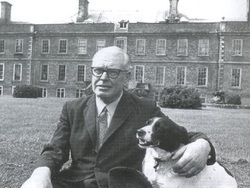 Philip Yorke and Trixie One afternoon, shortly after my Uncle Jack had been appointed vicar of Chirk, he decided to call at Erddig Hall and introduce himself to Squire Yorke. Aunty Dorothy, who had accompanied him that afternoon, decided to stay in the car which was parked at the front of the house while her husband went off to see if he could rouse someone and make himself known. He had been gone some time, about ten minutes, when the main door to the great house opened and an elderly gentleman popped out. He sauntered down the steps and greeted Aunt Dorothy warmly. He introduced himself as Philip Yorke, and asked if she would care to
Philip Yorke and Trixie One afternoon, shortly after my Uncle Jack had been appointed vicar of Chirk, he decided to call at Erddig Hall and introduce himself to Squire Yorke. Aunty Dorothy, who had accompanied him that afternoon, decided to stay in the car which was parked at the front of the house while her husband went off to see if he could rouse someone and make himself known. He had been gone some time, about ten minutes, when the main door to the great house opened and an elderly gentleman popped out. He sauntered down the steps and greeted Aunt Dorothy warmly. He introduced himself as Philip Yorke, and asked if she would care to
join them for tea. From Mr Yorke's friendly manner she assumed that he was already acquainted with her husband. Confident that she would soon be reunited with her partner she happily went along with the nice gentleman.
Yet, when she was shown into the parlour, there was no sign whatever of Jack, and the tea tray was only arranged for two. However, at this point she didn't doubt for a moment that her husband would be appearing very soon. Aunty Dorothy and Philip Yorke chatted, shared a pot of tea and ate some sandwiches together. But as time went on she couldn't help wondering where her Jack had got to. Mr Yorke was a charming host, but after another fifteen minutes or so, and with still with no sign of or mention of her husband, she was starting to feel more than a little bit uncomfortable.
Finally, after making much polite conversation, Philip Yorke graciously enquired of his guest, “And so my dear, why have you come here to see me today?”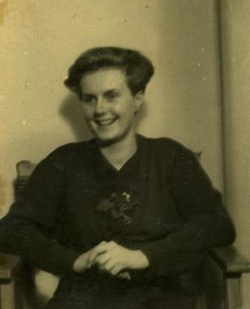 Aunty Dorothy Aunty Dorothy said it suddenly struck her that the man she'd had tea with didn’t have the foggiest clue who on earth she was. She also immediately pictured all kinds
Aunty Dorothy Aunty Dorothy said it suddenly struck her that the man she'd had tea with didn’t have the foggiest clue who on earth she was. She also immediately pictured all kinds
of terrible accidents that may have befallen her Jack. However, fortunately, at that very moment the door opened and in entered her husband along with Bertram
Heyhoe. Bertram was an old friend of Philip Yorke's, also from his earliest days in repertory theatre, who had lived at the house with him for a number of years. It turned out that Jack, when he’d left Dorothy in the car, had ventured round the back of the house where he’d bumped into Bertram who'd proceeded to give him a brief tour of the house and its gardens.
They all had a jolly good laugh about the confusion and some more tea and sandwiches
were produced.
(I think this tale dates from the early 1970s. We recently drove up to North Wales to attend my Aunty Dorothy's funeral. She was eighty-eight years of age, had experienced some poor health recently but died peacefully in the company of her daughter, Penny. Aunty Dorothy had a dry sense of humour; she was warm and kind but could appear to be a little vague and absent-minded. I am assured by her son, Michael, that the above story is not alone in the many misunderstandings that often took place around her. She and my own mother had played together as girls. When they met in later years it was always a pleasure to watch them
interact and see how swiftly their old cameraderie was resumed. Aunty Dorothy was a rich character and my family and I will most certainly miss her).
Over thirty years ago, aged twenty, I went to a party in South Kensington and met the
girl who I would later marry. It took just a few chats to ascertain that Judith's sister, also at the party that evening, had until recently lived in the Denbighshire village of Chirk. I immediately pointed out that my uncle Jack Dennis (married to my Aunty Dorothy - my mother's first cousin - so not really an aunty but enough to earn the title if you're Welsh) was the local vicar there. There were other connections too that my new girlfriend had with the area around Chirk. Her father, the late actor James Hayter, had once played in a repertory theatre company back in the early 1930s with a chap called Philip Yorke. Philip Yorke would later become the Squire of Erddig, a great house near the town of Wrexham in North Wales - a fairly short distance from Chirk. Philip Yorke had inherited the house and title of Sherrif from his late brother. As
children, my wife and her siblings had sometimes stayed at Erddig Hall and all had been deeply touched by the gentle kindness of PhilipYorke. After the death of his brother, the death duties were so punitive, that the lion's share of anything that was sold went off to enrich the taxman. Philip Yorke was a man of humble needs and lived on a meagre income in the vast crumbling pile that he dearly loved.
Some time later (approx 1978), when I was working at the theatre in Mold in North Wales, Judith came up for a brief visit and I took her to meet my Uncle Jack and Aunty Dorothy in Chirk. When Judith explained her connection with Erddig Hall and Philip Yorke, my Aunt told us this story - worthy of P G Wodehouse in its eccentricity and dottiness I think!
 Philip Yorke and Trixie One afternoon, shortly after my Uncle Jack had been appointed vicar of Chirk, he decided to call at Erddig Hall and introduce himself to Squire Yorke. Aunty Dorothy, who had accompanied him that afternoon, decided to stay in the car which was parked at the front of the house while her husband went off to see if he could rouse someone and make himself known. He had been gone some time, about ten minutes, when the main door to the great house opened and an elderly gentleman popped out. He sauntered down the steps and greeted Aunt Dorothy warmly. He introduced himself as Philip Yorke, and asked if she would care to
Philip Yorke and Trixie One afternoon, shortly after my Uncle Jack had been appointed vicar of Chirk, he decided to call at Erddig Hall and introduce himself to Squire Yorke. Aunty Dorothy, who had accompanied him that afternoon, decided to stay in the car which was parked at the front of the house while her husband went off to see if he could rouse someone and make himself known. He had been gone some time, about ten minutes, when the main door to the great house opened and an elderly gentleman popped out. He sauntered down the steps and greeted Aunt Dorothy warmly. He introduced himself as Philip Yorke, and asked if she would care to join them for tea. From Mr Yorke's friendly manner she assumed that he was already acquainted with her husband. Confident that she would soon be reunited with her partner she happily went along with the nice gentleman.
Yet, when she was shown into the parlour, there was no sign whatever of Jack, and the tea tray was only arranged for two. However, at this point she didn't doubt for a moment that her husband would be appearing very soon. Aunty Dorothy and Philip Yorke chatted, shared a pot of tea and ate some sandwiches together. But as time went on she couldn't help wondering where her Jack had got to. Mr Yorke was a charming host, but after another fifteen minutes or so, and with still with no sign of or mention of her husband, she was starting to feel more than a little bit uncomfortable.
Finally, after making much polite conversation, Philip Yorke graciously enquired of his guest, “And so my dear, why have you come here to see me today?”
 Aunty Dorothy Aunty Dorothy said it suddenly struck her that the man she'd had tea with didn’t have the foggiest clue who on earth she was. She also immediately pictured all kinds
Aunty Dorothy Aunty Dorothy said it suddenly struck her that the man she'd had tea with didn’t have the foggiest clue who on earth she was. She also immediately pictured all kinds of terrible accidents that may have befallen her Jack. However, fortunately, at that very moment the door opened and in entered her husband along with Bertram
Heyhoe. Bertram was an old friend of Philip Yorke's, also from his earliest days in repertory theatre, who had lived at the house with him for a number of years. It turned out that Jack, when he’d left Dorothy in the car, had ventured round the back of the house where he’d bumped into Bertram who'd proceeded to give him a brief tour of the house and its gardens.
They all had a jolly good laugh about the confusion and some more tea and sandwiches
were produced.
(I think this tale dates from the early 1970s. We recently drove up to North Wales to attend my Aunty Dorothy's funeral. She was eighty-eight years of age, had experienced some poor health recently but died peacefully in the company of her daughter, Penny. Aunty Dorothy had a dry sense of humour; she was warm and kind but could appear to be a little vague and absent-minded. I am assured by her son, Michael, that the above story is not alone in the many misunderstandings that often took place around her. She and my own mother had played together as girls. When they met in later years it was always a pleasure to watch them
interact and see how swiftly their old cameraderie was resumed. Aunty Dorothy was a rich character and my family and I will most certainly miss her).
Published on May 22, 2013 14:13
May 16, 2013
Road Rage - A Sad Reality if Driving in the UK
I thought as I'd written a book entitled Roadrage - which certainly 'appears' to contain a road rage incident - that I ought to take a look at road rage as the fairly common experience it is on Britain's roads. According to recent statistics Britain holds the title as world road rage capital. Nothing to be proud of about that you might think? Apparently not so; according to one motoring magazine three out of five of those admitting they had themselves been guilty of committing road rage, declared they felt okay about it and that the other person deserved it. According to a recent Gallup poll, over 80% of British drivers have at some time fallen victim to it with an astounding nine out of ten UK drivers being on the receiving end of it at least once.
In the process of researching this blog piece, I came across some pretty horrendous stuff, like the thirty year old male who physically assaulted an eighty-one year old woman and left her with facial injuries and feeling extremely scared and vulnerable. The reason the man gave for the attack was that the woman was driving too slowly. Speaking in his own defence and trying to justify his vicious assault on her, he claimed the woman had attacked him first. Apparently this was after he'd called her, "A f****ing bitch," and a "Stupid old cow" and she had quietly gestured with a hand towards his mouth and asked him not to use such bad language. Or, how about the van driver who was so irritated by another road user's driving, and after they had each exchanged a few rude gesticulations, produced a gun and pointed it at them in a threatening manner. It turned out to be a toy gun! Funny huh? An incident between two female drivers reported in the Guardian recently, left one woman dead after the other one drove her car directly at her after an argument then sped away from the crime scene.
Yes, driving can be a stressful business but I can't believe anyone in their right mind would consider the three examples I give above as remotely justifiable. I suspect road rage incidents say far more about the society we live in, a society that we are all responsible for creating, than we might readily care to admit. My parents instilled into me a respect for others, especially for those who are elderly, less capable, or are vulnerable in some way. I just can't imagine being angry enough to strike an eighty-one year old woman or to verbally abuse her as described above, no matter how slow she's driving!
Three words spring unheeded to mind, they strike me as words far more commonly used in the past - but then perhaps I'm in danger here of looking back through rose tinted specs. I don't know, we were most definitely a less affluent, aspirational society when I was a youngster and three little words seem to have been far more prevalent then. The words I'm thinking of: respectfulness, politeness and courtesy. The only time I hear that word 'courtesy' these days is when our car breaks down and we get a replacement one for a day or two.
In the process of researching this blog piece, I came across some pretty horrendous stuff, like the thirty year old male who physically assaulted an eighty-one year old woman and left her with facial injuries and feeling extremely scared and vulnerable. The reason the man gave for the attack was that the woman was driving too slowly. Speaking in his own defence and trying to justify his vicious assault on her, he claimed the woman had attacked him first. Apparently this was after he'd called her, "A f****ing bitch," and a "Stupid old cow" and she had quietly gestured with a hand towards his mouth and asked him not to use such bad language. Or, how about the van driver who was so irritated by another road user's driving, and after they had each exchanged a few rude gesticulations, produced a gun and pointed it at them in a threatening manner. It turned out to be a toy gun! Funny huh? An incident between two female drivers reported in the Guardian recently, left one woman dead after the other one drove her car directly at her after an argument then sped away from the crime scene.
Yes, driving can be a stressful business but I can't believe anyone in their right mind would consider the three examples I give above as remotely justifiable. I suspect road rage incidents say far more about the society we live in, a society that we are all responsible for creating, than we might readily care to admit. My parents instilled into me a respect for others, especially for those who are elderly, less capable, or are vulnerable in some way. I just can't imagine being angry enough to strike an eighty-one year old woman or to verbally abuse her as described above, no matter how slow she's driving!
Three words spring unheeded to mind, they strike me as words far more commonly used in the past - but then perhaps I'm in danger here of looking back through rose tinted specs. I don't know, we were most definitely a less affluent, aspirational society when I was a youngster and three little words seem to have been far more prevalent then. The words I'm thinking of: respectfulness, politeness and courtesy. The only time I hear that word 'courtesy' these days is when our car breaks down and we get a replacement one for a day or two.
Published on May 16, 2013 10:00

 I'm still enjoying my wife Judith's recent about-face with regards the Western genre. I wrote a piece about this (see
I'm still enjoying my wife Judith's recent about-face with regards the Western genre. I wrote a piece about this (see  I've just spent the last two months working my way through The Richard Burton Diaries - edited by Chris Williams,
I've just spent the last two months working my way through The Richard Burton Diaries - edited by Chris Williams, 

